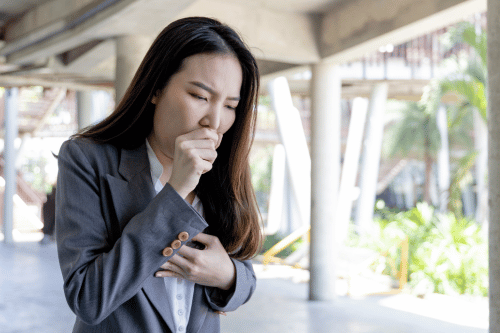Anxiety and Coughing: A Surprising Connection Explained
Anxiety can affect every system in the body, including the respiratory tract. One unexpected symptom is a persistent cough. This blog explores how coughing may be a sign of anxiety, what causes it, and how to treat it.
How Anxiety Affects the Body
Anxiety activates the body’s stress response. This increases the release of stress hormones like cortisol and adrenaline. These hormones raise heart rate, muscle tension, and breathing rate.

Nervous System and Vagus Nerve Activation
The vagus nerve controls parts of the respiratory system, throat, and stomach. Anxiety stimulates this nerve, which may trigger a cough, sore throat, or pharynx irritation. It can also increase mucus and throat pain through tension and stress hormone release.
Hyperventilation and Respiratory Effects
Panic attacks often involve shallow breathing or hyperventilation. This can cause chest tightness, shortness of breath, dizziness, or coughing. These symptoms mimic those of a physical disease, which may confuse the patient and delay diagnosis.
Anxiety and Habit Cough
A habit cough is a dry, non-productive cough not caused by illness. It can result from psychological stress, panic disorder, or generalized anxiety disorder.
Behavior and Mental Distress
Over time, habit coughing can become an unconscious behavior. Mental distress and chronic stress reinforce the action. This is especially true for patients experiencing major depressive disorder or borderline personality disorder.
Somatic Symptom Disorder
In some cases, coughing may be part of a somatic symptom disorder. The symptom is real but originates from anxiety or another psychiatric condition. These symptoms may include cough, pharynx tightness, sore throat, and even nasal congestion.
Medical Conditions vs. Anxiety Cough
A cough can be a symptom of several medical diseases, such as asthma, bronchitis, sinusitis, and gastroesophageal reflux disease (GERD). Anxiety-related cough often coexists with these conditions, making diagnosis difficult.
Physical Conditions to Rule Out
Before assigning the cause to anxiety, health care professionals must rule out physical causes like lung cancer, whooping cough, or chronic bronchitis. Air pollution, pollen, smoke, and bacteria are common respiratory tract irritants.

Using the Diagnostic and Statistical Manual
If no disease is found, a health professional may refer the patient to psychiatry. Using the Diagnostic and Statistical Manual of Mental Disorders, a diagnosis such as panic disorder, anxiety disorder, or somatic symptom disorder may be made.
The Role of the Immune and Respiratory Systems
The immune system and respiratory tract are affected by stress and mental health conditions. Anxiety may lead to shallow breathing, acid buildup in the stomach, and inflammation in the throat.
Chronic Stress and the Immune Response
Chronic stress weakens the immune system and increases inflammation. This may lead to mucus buildup, sinusitis, and pharynx irritation—contributing to persistent coughing.
Sleep, Fatigue, and Inflammation
Lack of sleep, fatigue, and psychological stress impair recovery. Patients may experience weight loss, headaches, nasal congestion, and ongoing inflammation of the larynx or nose.
Comorbidities and Risk Factors
Anxiety and coughing often appear together with other medical or psychiatric conditions.
Mental and Physical Comorbidity
Patients with asthma or GERD may develop anxiety due to chronic symptoms. Studies including retrospective cohort studies and cohort studies on PubMed show comorbidity between chronic disease, substance abuse, and panic attack frequency.
Psychosocial Factors and Behavior
Social pressure, stress at work, or family issues can trigger emotional distress. This may lead to both shallow breathing and anxiety symptoms such as cough, palpitations, or exhalation difficulty.
Environmental and Emotional Triggers
Air quality and emotional states play a major role in coughing.
Irritants and Allergens
Exposure to pollen, bacteria, or air pollution can irritate the respiratory tract. These irritants may worsen inflammation, mucus, and symptoms already heightened by psychological stress or panic.
Emotional Triggers and the Brain
Emotions like fear and panic stimulate parts of the brain linked to breathing and cough reflexes. This connection, via the vagus nerve, explains why mood and mental health affect physical symptoms.
Physical Symptoms of Anxiety-Induced Cough
Patients often present with symptoms beyond coughing. These include chest tightness, shortness of breath, dizziness, pain in the abdomen or neck, and headaches.

Muscle Tension and Pressure
Chronic stress causes muscle tightness in the chest, neck, and throat. This can feel like pressure or even mimic the symptoms of bronchitis or the common cold.
Digestive and Stomach Issues
Anxiety affects the stomach and esophagus. Increased acid levels can result in GERD, leading to throat irritation and cough. This is common in patients with anxiety disorder and gastroesophageal reflux disease.
Diagnosis and Treatment Approaches
Identifying anxiety-related coughing starts with a full medical and psychiatric evaluation.
Health Professional Evaluation
A physician or mental health professional will take into account physical health, psychiatric history, and environmental exposures. Diagnosis is based on both physical exams and behavior patterns.
Psychiatry and Mental Health Intervention
Psychiatry plays a central role in diagnosis and treatment. Anxiety, major depressive disorder, panic attacks, and somatic symptom disorder often require therapy, lifestyle changes, or medication.
Effective Techniques for Relief
Treatments aim to calm the nervous system, improve breathing, and manage stress.
Breathing Exercises
Diaphragmatic breathing and progressive muscle relaxation help reduce shallow breathing and stop habit coughs. Exhalation techniques calm the vagus nerve.
Stress Management and Relaxation
Meditation, yoga, and other relaxation techniques lower stress hormones like cortisol. These methods also improve sleep, mood, and immune system strength.
Lifestyle Adjustments
A healthy diet rich in anti-inflammatory foods supports lung and digestive health. Avoiding acid-producing foods, smoke, and pollutants reduces GERD, asthma symptoms, and cough triggers.
How Revival Mental Health Can Help with Anxiety
Revival Mental Health in Orange County provides expert mental health care for patients struggling with anxiety, panic disorder, and other psychiatric conditions.
We offer evidence-based care using the latest tools in psychiatry, psychology, and neuroscience. From individualized therapy and stress management programs to medication and group support, Revival Mental Health designs care plans that consider every aspect of the patient’s health—mind, body, and behavior. Patients experiencing cough related to anxiety, substance abuse, or somatic symptom disorder can find relief through integrated treatment at our clinic.
Our team uses diagnostics based on the Diagnostic and Statistical Manual of Mental Disorders and focuses on comorbidity with diseases like GERD, asthma, or major depressive disorder. We help each patient develop practical skills such as diaphragmatic breathing, progressive muscle relaxation, and attention regulation to manage anxiety symptoms long-term.
FAQ's
1. Can anxiety cause coughing without other symptoms?
Yes, anxiety can trigger a dry cough even without fever, mucus, or chest pain. It often results from throat irritation caused by stress or hyperventilation.
2. Is an anxiety cough contagious?
No, anxiety-related coughing is not caused by bacteria or viruses. It is a behavioral or physiological reaction, not an infectious disease.
3. Can medications for anxiety stop coughing?
Some medications like SSRIs or anxiolytics may reduce anxiety and related coughing. A mental health professional or psychiatrist should oversee this treatment.
4. Can kids develop anxiety-related coughs?
Yes, children may develop habit coughs due to psychological stress or panic. Behavioral therapy and breathing exercises can help manage the symptoms.
Visit SAMHSA or contact us today for more information.





